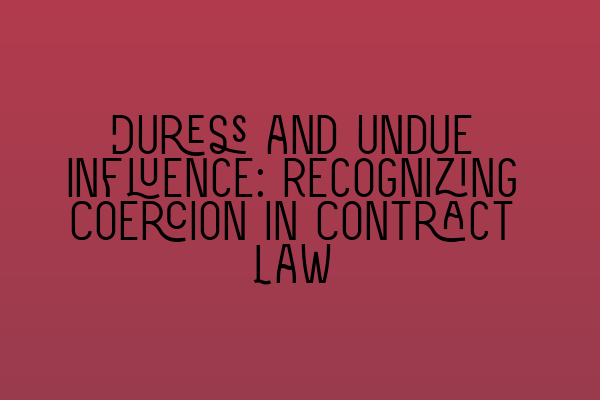Duress and Undue Influence: Recognizing Coercion in Contract Law
As a solicitor, it is crucial to understand the concepts of duress and undue influence in contract law. These principles are fundamental in determining the validity of a contract and play a significant role in ensuring fair and ethical business practices. In this blog post, we will explore what duress and undue influence entail, how they can be recognized, and their implications for contract law.
Duress occurs when a person is forced or coerced into entering into a contract against their will. This can take various forms, such as physical threats, blackmail, or economic pressure. It is essential to note that duress involves the absence of free and voluntary consent, as the party under duress is effectively deprived of their ability to make an informed decision.
On the other hand, undue influence refers to a situation where one party exerts an improper degree of control or influence over another, leading to the creation of a contract that does not accurately reflect the true intentions of the influenced party. Undue influence may arise in relationships where there is a power imbalance, such as between family members, close friends, or business associates. It is important to recognize that undue influence can be subtle and may not always involve overt coercion or threats.
To determine whether duress or undue influence exists in a contract, several factors need to be considered. These include:
1. Circumstances surrounding the contract: Was the contract entered into under extraordinary circumstances that may indicate the presence of duress or undue influence? For example, was there an urgent need that one party exploited to gain an advantage?
2. Power dynamics between the parties: Is there a significant power imbalance between the parties involved? If so, it raises the potential for undue influence to have taken place.
3. Independent legal advice: Did the party allegedly under duress or undue influence have the opportunity to seek independent legal advice before entering into the contract? This is crucial in establishing whether there was a fair negotiation process or if one party dominated the decision-making.
4. Unconscionability: Does the outcome of the contract appear to be unconscionable or unfair? If the terms of the contract heavily favor one party at the expense of the other, it may be an indicator of duress or undue influence.
Recognizing duress and undue influence requires a careful analysis of the specific facts and circumstances surrounding the contract. It is essential to gather relevant evidence, including testimonies, records, and documents, to support any claims of coercion or improper influence.
If duress or undue influence is proven, the contract may be deemed voidable, meaning that the affected party can choose to rescind or enforce the contract, depending on the circumstances. In some cases, the party under duress or undue influence may seek damages or other remedies to compensate for their losses.
Ensuring contract validity and fairness is essential in upholding the integrity of contract law. By recognizing and addressing instances of duress and undue influence, we can promote fair and equitable business practices that protect vulnerable parties.
To learn more about contract law and prepare for the SQE exams, consider checking out the following related articles:
– SQE 1 Practice Exam Questions
– SQE 1 Practice Mocks FLK1 FLK2
– SQE 2 Preparation Courses
– SQE 1 Preparation Courses
– SRA SQE Exam Dates
These resources offer valuable insights and study materials to help you excel in your SQE exams and develop a comprehensive understanding of contract law principles.
Remember, as a solicitor, it is your duty to protect the interests of your clients and ensure the validity and fairness of contracts. By familiarizing yourself with duress and undue influence, you can effectively navigate complex contractual situations and advocate for justice and equity in business transactions.
